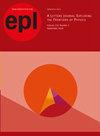多元拓扑半金属
IF 1.8
4区 物理与天体物理
Q2 PHYSICS, MULTIDISCIPLINARY
引用次数: 0
摘要
具有多折带交叉的拓扑半金属的发现为拓扑物理学领域开辟了一个令人兴奋的新领域。这些材料表现出较大的切尔诺数,导致其表面出现长长的双费米弧,并受到晶体对称性或拓扑秩序的保护。这些多重交叉的影响超出了表面科学的范畴,因为它们不受准粒子波恩卡分类的限制,只需尊重 1651 个磁空间群之一的晶体对称性。因此,我们观察到固态系统中出现了自由费米子激元,它们没有高能对应物,受到非对称对称性的保护。在这项工作中,我们回顾了多折拓扑半金属领域最近取得的理论和实验进展。我们从所谓多折费米子的理论预测开始,讨论随后发现的手性和磁性拓扑半金属。我们介绍了在光谱测量中实现手性半金属的几项实验,并讨论了这一领域的未来前景。这些令人兴奋的发展有可能加深我们对量子物质基本特性的理解,并在未来激发新的技术应用。本文章由计算机程序翻译,如有差异,请以英文原文为准。
Multifold topological semimetals
The discovery of topological semimetals with multifold band crossings has opened up a new and exciting frontier in the field of topological physics. These materials exhibit large Chern numbers, leading to long double Fermi arcs on their surfaces, which are protected by either crystal symmetries or topological order. The impact of these multifold crossings extends beyond surface science, as they are not constrained by the Poincar classification of quasiparticles and only need to respect the crystal symmetry of one of the 1651 magnetic space groups. Consequently, we observe the emergence of free fermionic excitations in solid-state systems that have no high-energy counterparts, protected by non-symmorphic symmetries. In this work, we review the recent theoretical and experimental progress made in the field of multifold topological semimetals. We begin with the theoretical prediction of the so-called multifold fermions and discuss the subsequent discoveries of chiral and magnetic topological semimetals. Several experiments that have realized chiral semimetals in spectroscopic measurements are described, and we discuss the future prospects of this field. These exciting developments have the potential to deepen our understanding of the fundamental properties of quantum matter and inspire new technological applications in the future.
求助全文
通过发布文献求助,成功后即可免费获取论文全文。
去求助
来源期刊

EPL
物理-物理:综合
CiteScore
3.30
自引率
5.60%
发文量
332
审稿时长
1.9 months
期刊介绍:
General physics – physics of elementary particles and fields – nuclear physics – atomic, molecular and optical physics – classical areas of phenomenology – physics of gases, plasmas and electrical discharges – condensed matter – cross-disciplinary physics and related areas of science and technology.
Letters submitted to EPL should contain new results, ideas, concepts, experimental methods, theoretical treatments, including those with application potential and be of broad interest and importance to one or several sections of the physics community. The presentation should satisfy the specialist, yet remain understandable to the researchers in other fields through a suitable, clearly written introduction and conclusion (if appropriate).
EPL also publishes Comments on Letters previously published in the Journal.
 求助内容:
求助内容: 应助结果提醒方式:
应助结果提醒方式:


